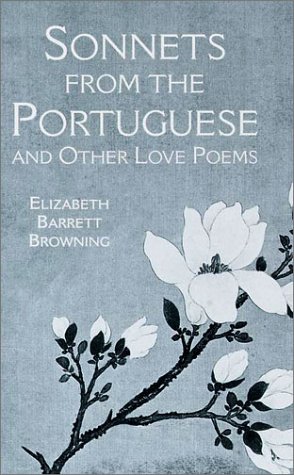“God’s gifts put man’s best dreams to shame.” – Sonnet XXVI
 It should come as no suprise that poets, who tend to feel passionately and think intensely, should fall passionately and intensely in love. “First time he kissed me, he but only kissed / The fingers of this hand wherewith I write,” swooned Elizabeth Barrett Browning in her love poems to her husband, Robert Browning, in Sonnets From the Portuguese (1850), and went on to describe how that kiss affected her hand so that her hand almost takes on a life of its own, as does the imprint of the kiss itself. Barrett’s gaze of love imbues inanimate objects with life, as if love enables one to see the very atoms and molecules of the universe dancing.
It should come as no suprise that poets, who tend to feel passionately and think intensely, should fall passionately and intensely in love. “First time he kissed me, he but only kissed / The fingers of this hand wherewith I write,” swooned Elizabeth Barrett Browning in her love poems to her husband, Robert Browning, in Sonnets From the Portuguese (1850), and went on to describe how that kiss affected her hand so that her hand almost takes on a life of its own, as does the imprint of the kiss itself. Barrett’s gaze of love imbues inanimate objects with life, as if love enables one to see the very atoms and molecules of the universe dancing.
The adoration E. B. Browning declares for her husband in Sonnets is so passionate that it might come across to modern Christian readers (who are typically unfamiliar with not only classic poetry in general but sonnets in particular – the classic love poem which sets the beloved as an object of worship and admiration) as idol worship, but I would humbly suggest such a reaction might indicate how little we adore God himself, as our veneration for him ought to be even greater (and our love for our spouses greater as well). But E. B. Browning writes in Sonnets that “God’s gifts put man’s best dreams to shame,” revealing how the greatest gift of her life, her husband, who is a more wonderful gift than she could ever have dreamed of, proves God’s superior goodness and worthiness. “Atheists are…dull, who cannot guess God’s presence out of sight,” she scoffs in Sonnet XX; gifts must come from a giver, and a good gift comes from an even greater giver. 
Browning’s life story was dramatic. Robert Browning became enraptured with her poetry, and arranged to meet the poet on her sickbed, whereupon he fell deeply in love with her. However, to elude Elizabeth’s tyrannical father, who refused to consent to any of his children marrying, Elizabeth and Robert married secretly and fled to Italy, where she recovered her health and they lived happily. The Browning’s romance was dramatized in a 1930’s film titled The Barretts of Wimpole Street, which was nominated for two Oscars.
The title for E. B. Brownings Sonnets From the Portuguese arises from Robert Browning affectionately calling her “my little Portuguese,” because of her dark hair and complexion. One of the most famous poems from the collection, “Sonnet XLIII: How Do I Love Thee?”, follows.
How Do I Love Thee?
How do I love thee? Let me count the ways.
I love thee to the depth and breadth and height
My soul can reach, when feeling out of sight
For the ends of being and ideal grace.
I love thee to the level of every day’s
Most quiet need, by sun and candle-light.
I love thee freely, as men strive for right.
I love thee purely, as they turn from praise.
I love thee with the passion put to use
In my old griefs, and with my childhood’s faith.
I love thee with a love I seemed to lose
With my lost saints. I love thee with the breath,
Smiles, tears, of all my life; and, if God choose,
I shall but love thee better after death.
Read more about Elizabeth Barrett Browning’s novel Aurora Leigh on CVL:
Introducing “Aurora Leigh” by Elizabeth Barrett Browning
Faith vs. Works in “Aurora Leigh” by Elizabeth Barrett Browning
In my experience university professors are always eager to point out when writers might be losing their Christian faith. But I think when carefully analyzed within the context of her faith and her life story, the meaning of the sentence becomes quite unambiguous.
In Christianity, “saints” refers simply to Christians. She writes that some “saints” either caused her to stop loving them for some reason or to become disillusioned with love in general, making it increasingly difficult for her to feel capable of loving. Likely her father, whose tyrannical tendencies became more and more evident to Browning as she grew up, is one of these “lost saints.” I cannot find a source at the moment but others have written about how Sonnets From the Portuguese demonstrates, in part, E. B. Browning endeavouring to disentangle herself from her father and his oppressive influence over her life. The event of Robert Browning falling in love with her – older than him, an invalid – appears to be almost too wonderful for her to believe, but if it be true it inspires her to love again, “with a love I seemed to love / With my lost saints.” If anything, the line demonstrates a revival of faith.
Thank you very much for you comment!
This is a fascinating post. I like your take on E.B. Browning’s relationship with God. Regarding sonnet XLIII, “I love thee with a love I seemed to lose/ With my lost saints”: In a literature class, I was told that these lines show how Browning has taken the love she once had for her religion and focusing it instead on her husband. How would you interpret these lines in light of quotes from Browning’s other poems about her relationship with her Maker? Once again, thank you for this great post!